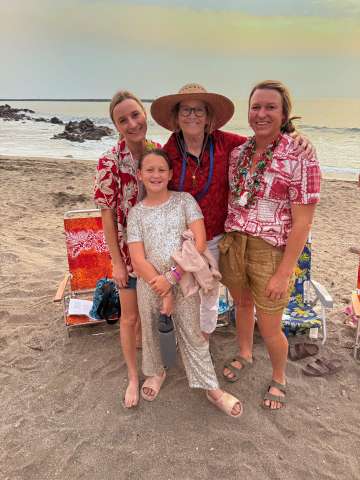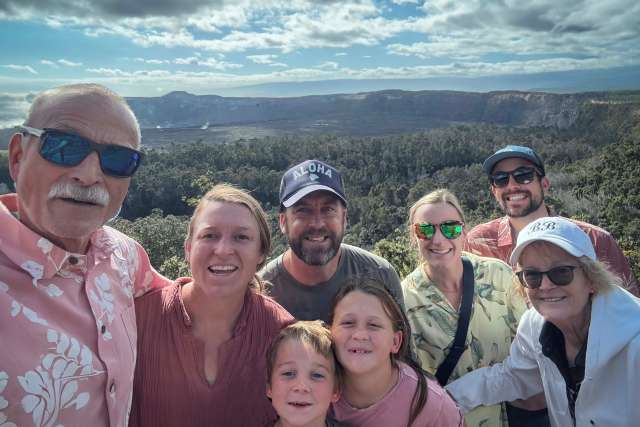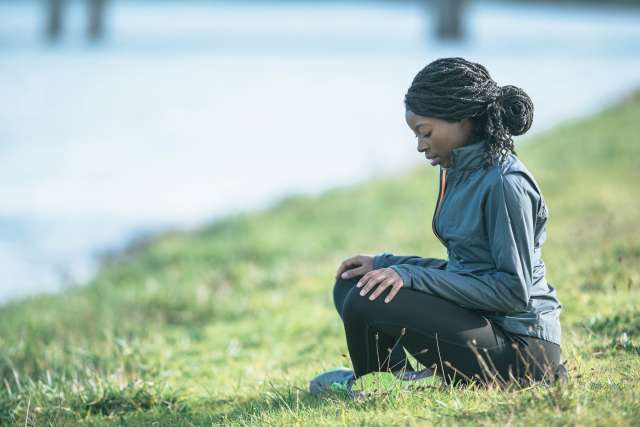On Halloween night in 2021, Bonnie Wham-Prutow and her family faced a real-life nightmare. The emergency room doctor on the Big Island of Hawaii had just told her that she had metastatic brain cancer, and they believed she only had a couple of weeks to live.
Bonnie and her husband, David, were completely taken by surprise. Bonnie had previously visited her primary care doctor for headaches and balance issues, but was told she had vertigo.
To say they were devastated would be an understatement.
“We were really caught off guard,” said Bonnie, 69. “We went from getting ready to go trick-or-treating with our grandkids to being told I had maybe weeks to live.”
Metastatic brain cancer, or brain metastases, occurs when cancer spreads to the brain from other parts of the body. It affects between 10% and 25% of adult cancer patients, with an estimated 98,000 to 170,000 new cases diagnosed annually — a number that continues to increase.
It turns out the breast cancer Bonnie thought she had beaten years ago had returned, but this time it was in her brain. Her MRI showed an extensive number of inoperable tumors.
Her doctor in Hawaii gave her one option: hospice.
Bonnie, David and their two daughters, Lauren and Erin, didn’t accept the prognosis and began searching for the best medical team and care available. That search led them to UCLA Health.
A multidisciplinary team of experts
Bonnie’s first stop was to neurosurgeon Won Kim, MD, associate professor of neurosurgery and co-director of the Stereotactic Radiosurgery and Brain Metastasis Program at UCLA.
After reviewing Bonnie’s scans, Dr. Kim recommended whole brain radiation therapy as the best course of action, as surgery was not an option due to the number and location of the metastases. In addition, Bonnie had developed leptomeningeal disease, a condition that occurs when cancer cells spread to the cerebrospinal fluid that surround the brain and spinal cord.
But before they could start treatment, they had to get Bonnie out to Los Angeles, which carried some potential health risks.
“Flying, where there is less atmospheric pressure, can cause brain swelling,” said Dr. Kim, an investigator at the UCLA Health Jonsson Comprehensive Cancer Center. “Normally, this isn’t a big issue, but in Bonnie’s case, if she had experienced a bleed, seizure, or additional swelling during the flight, it could have led to a stroke or coma.”
But Bonnie and her family decided it was worth the risk. Dr. Kim prescribed an anti-seizure and steroid medications to help with the flight and Bonnie made it safely to UCLA Health the next day.
After initial workups, Bonnie met with radiation oncologist Tania Kaprealian, MD, MBA, professor and vice chair of clinical operations for radiation oncology and co-director of the Stereotactic Radiosurgery and Brain Metastasis Program, for her first radiation treatment.
“Given the number of tumors and the fact that cancer cells had spread into the cerebrospinal fluid, we needed to radiate the entire brain to shrink the tumors and slow disease progression overall in the brain,” said Dr. Kaprealian, who is also an investigator at the UCLA Health Jonsson Comprehensive Cancer Center. “While whole brain radiation may affect some cognition and short-term memory over time, you can still remain fully functional. You will recognize your friends and family, enjoy your days, perform your daily activities, and can maintain a good quality of life.”

After completing radiation, Bonnie’s symptoms started to improve, especially the severe headaches she was experiencing for months. The next step would to be revaluate in three months to determine the effectiveness of the radiation.
“At this time, we were now more optimistic about Bonnie being able to enjoy her days outside of the hospital,” said her husband, David. “We didn’t think three more months of life was in the forecast and now we finally felt like there was hope.”
Along with radiation, Bonnie would need chemotherapy to treat the HER2-positive breast cancer that had spread to a lymph node in her left armpit. The cancer had originated in her breast ducts, with a small portion escaping and metastasizing to her lymph nodes and brain.
Oncologist Kelly McCann, MD, PhD, assistant professor of hematology/oncology, gave Bonnie a combination of chemotherapy with drugs targeting HER2 (tucatinib, capecitabine and Herceptin). This regimen targets the entire body, including the brain.
Because Bonnie was handling the treatment well, Dr. McCann gave Bonnie and David the green light to go home to Hawaii for Thanksgiving, something they never thought would happen.
They returned to UCLA at the end of February for a three-month follow-up with the team. The news was better than they could have hoped.
Bonnie’s latest scans showed remarkable progress. Her lesions had either shrunk significantly or nearly disappeared, and all of her organs were clear. A brain MRI revealed a 70%–80% reduction in lesions, with the remaining ones continuing to shrink. A subsequent three-month scan showed no lesions. Additionally, her tumor markers, which were dangerously high in November 2021, had returned to normal levels.
What was originally thought to be a prognosis of just weeks was now uncertain.
“We were told Bonnie was doing spectacular and this was the best response to treatment possible,” said David.
This improvement underscored the importance of a skilled, collaborative approach.
"Having the breadth of experience from multidisciplinary teams allows us to find creative answers or find hope where others might not be able to see,” said Dr. Kim. “With tumors that respond well to targeted therapies, the prognosis is not as grim as it once seemed.”
Continuing to live life to the fullest
Now, more than three years after her diagnosis, Bonnie remains progression free, with no evidence of disease. She continues to receive infusions and is monitored by her team for any signs of recurrence.
"It was a blessing from God to lead us to this incredible UCLA team,” said Bonnie. “They saved my life."
Bonnie now has more time to spend with her family and friends, watch her grandchildren grow up and reach new milestones.
“Bonnie is not just surviving,” said David. “She’s thriving.”






